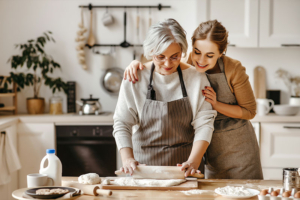
Use these culinary tips for dementia care to create joyful moments.
There’s something so special about the kitchen. It is the first stop kids make once they arrive home from school, in search of a snack as well as the chance to share about their day. It’s the spot family members gather to prepare holiday meals together. It’s also a place to warm up a cup of milk and find some quiet, reflective solace when sleep is elusive.
For someone with dementia, the kitchen can bring to mind precious memories such as these. Cooking engages multiple senses, making it an excellent activity to unlock the doors of reminiscence. The sizzle of ingredients in a pan, the rhythmic chopping of veggies, as well as the enticing scent of a well-seasoned dish can stir happy memories, sparking joy and connection.
If you would like to include culinary tips in your dementia care, these strategies can help.
- Keep it simple. Use uncomplicated recipes with familiar ingredients to promote a sense of accomplishment. If the person has a box of recipes or favorite cookbook, this is a great place to start. Identify several recipe options that would be simple to prepare, and then discuss which ones may spark interest. Or, you can search online for simple recipes based on the person’s particular tastes.
- Stay social. The objective should be to make the activity an occasion of togetherness, transforming the kitchen into a space where stories are exchanged, laughter is shared, and bonds are strengthened.
- Organize in advance. An organized approach, with ingredients lined up and ready and step-by-step instructions provided, will help ensure a more seamless and enjoyable experience.
- Make it personal. Consider the capabilities and preferences of the individual. Activities such as kneading dough, rolling out cookies, or tossing a salad can be confidence-boosting, empowering, and reinforce a sense of purpose while triggering memories.
The end goal should not be to create a Pinterest-worthy culinary production. Instead, focus on each of the senses being used and tap into any memories that may come to the surface.
Perhaps, for example, you’re making an apple pie. You can talk about how smooth the crust feels while you roll it out and the powdery flour that puffs into the air as you sprinkle it over the dough. Point out the sound of the apples being chopped, the delicious cinnamon butter aroma while the pie bakes. And naturally, enjoy a piece of the finished product together, encouraging any stories on the way that the person would like to share.
At Generations at Home, our skilled dementia caregivers are on hand to incorporate culinary experiences into an older adult’s care plan. Reach out to us online or call us at 727-940-3414 to learn more about our dementia care services in St. Petersburg, Pinellas Park, Seminole, and the surrounding areas.







